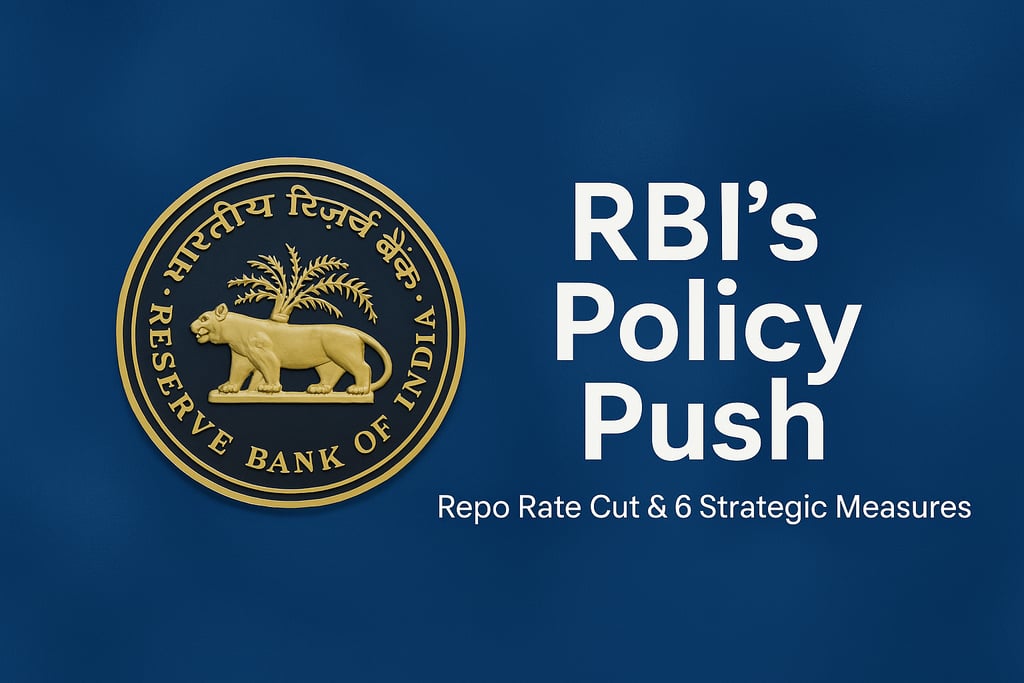RBI’s Policy Push: Repo Rate Cut & 6 Strategic Measures to Strengthen India’s Financial Ecosystem
The Reserve Bank of India (RBI), in its latest monetary policy announcement, cut the repo rate by 25 basis points, bringing it down from 6.25% to 6.00%.
Arjun K A
4/9/20252 min read


RBI’s Policy Push: Repo Rate Cut & 6 Strategic Measures to Strengthen India’s Financial Ecosystem
The Reserve Bank of India (RBI), in its latest monetary policy announcement, cut the repo rate by 25 basis points, bringing it down from 6.25% to 6.00%. Alongside this monetary easing, the RBI also shifted its policy stance from 'Neutral' to 'Accommodative', signaling a strong intent to support economic growth and boost credit availability.
In addition to the repo rate cut, the RBI unveiled six progressive measures aimed at strengthening the financial and digital infrastructure of the country. These reforms touch upon key areas including banking regulations, fintech innovation, digital payments, and lending practices.
🔍 Six Key Measures Announced by RBI
1. Market-Based Securitisation of Stressed Assets
To streamline the resolution of non-performing assets (NPAs), RBI proposed a framework to securitise stressed assets, encouraging market-led recovery. This initiative is expected to increase transparency and attract institutional buyers for distressed debt.
2. Expansion of Co-Lending Model
Previously limited to priority sectors, the co-lending model between banks and NBFCs will now be extended to include non-priority sectors. This reform aims to deepen credit penetration, particularly for underserved businesses and individuals.
3. Gold Loans for Broader Use
In a consumer-friendly move, gold loans can now be availed for both consumption and income-generating purposes. This change enhances financial inclusion and offers greater flexibility for rural and small-town borrowers.
4. Unified Guidelines for Partial Credit Enhancement (PCE)
The RBI will issue comprehensive guidelines for PCE instruments, used to support infrastructure project financing. This harmonization is expected to provide a much-needed boost to India’s infrastructure growth pipeline.
5. Increase in NPCI UPI Transaction Limits
To support high-value digital payments, the RBI has proposed raising the ₹2 lakh cap on transactions via the National Payments Corporation of India (NPCI). This will enhance convenience and efficiency in B2B and high-ticket consumer payments.
6. On-Tap Regulatory Sandbox for Fintech
The RBI is launching on-tap directions for regulatory sandbox participation, promoting a continuous, structured framework for fintech innovation and real-time testing of new financial products.
✅ Sectoral Impact: A Positive Outlook
Banking & NBFCs: The repo rate cut and co-lending expansion are set to increase liquidity and loan disbursals, especially in MSME and retail segments.
Infrastructure: Streamlined PCE guidelines will attract institutional investors to large-scale projects, supporting long-term capital formation.
Fintech & Payments: Higher UPI limits and sandbox expansion will foster digital innovation, encouraging startups and improving customer experience.
Consumers & Borrowers: With gold loans relaxed and repo rate reduced, borrowers can expect lower EMIs, easier credit, and more tailored loan offerings.
📈 In Summary
The RBI’s April 2025 policy package reflects a well-balanced approach — easing monetary policy while strengthening regulatory frameworks. These steps are not only timely but also crucial for catalyzing inclusive growth, fintech innovation, and credit access in India.
As the financial landscape evolves, these changes will likely set the tone for sustainable development in the post-pandemic economy — enabling businesses and individuals to thrive in a more resilient and digitized financial ecosystem.
to schedule a free introductory appointment
+91 81234 26999
FINSPIREYOU@OUTLOOK.COM
© 2026 All Rights Reserved Sukruthi Finspire You
Registration granted by SEBI (INA000020493) , Membership of Bombay Stock Exchange (BSE Enlistment number 2288), and certification from the National Institute of Securities Markets (NISM) in no way guarantee the performance of the Investment Advisor or provide any assurance of returns to Investors. Investments in the securities market are subject to market risks. Read all the related documents carefully.
ARJUN K A
pROPRIETOR sUKRUTHI
